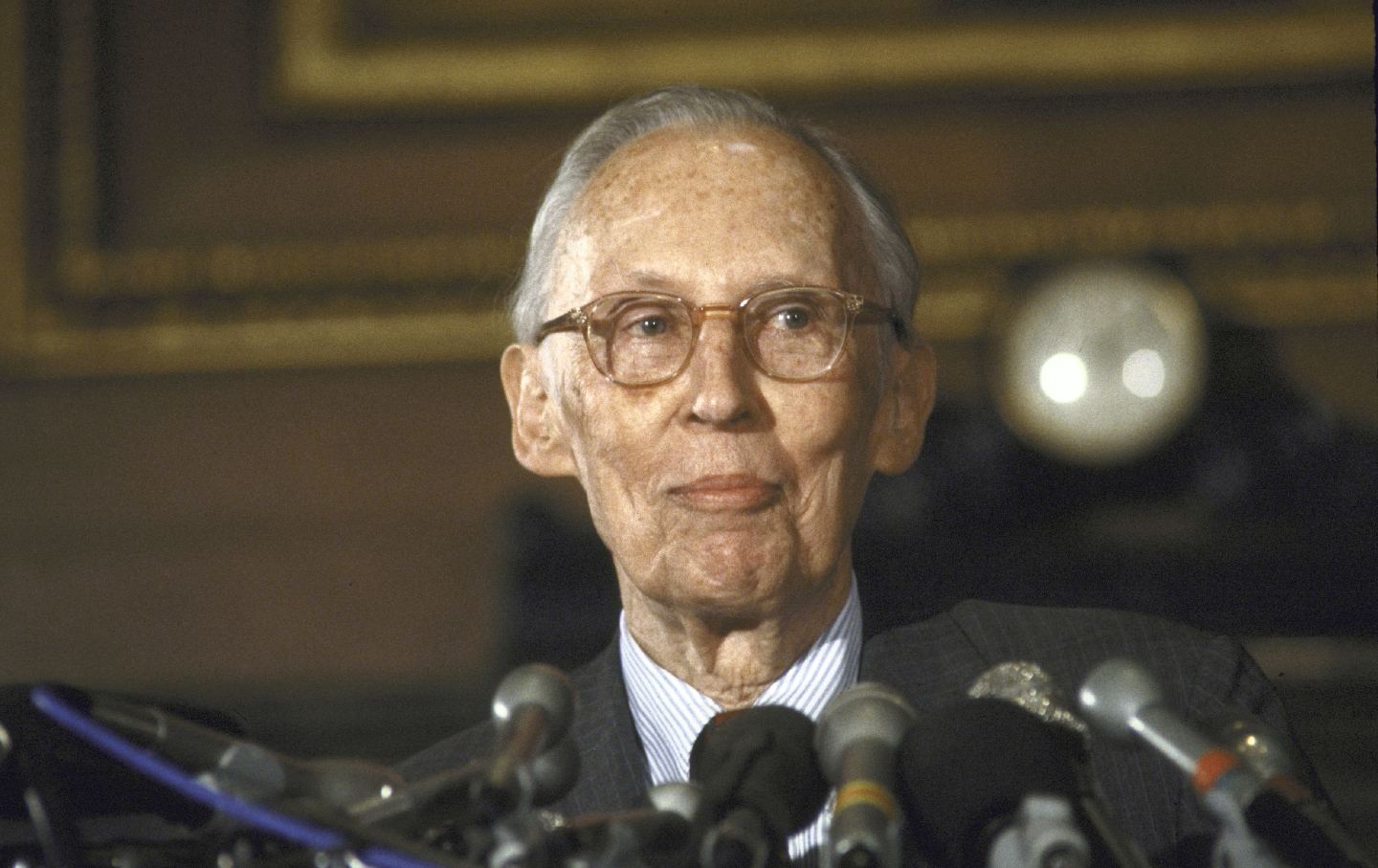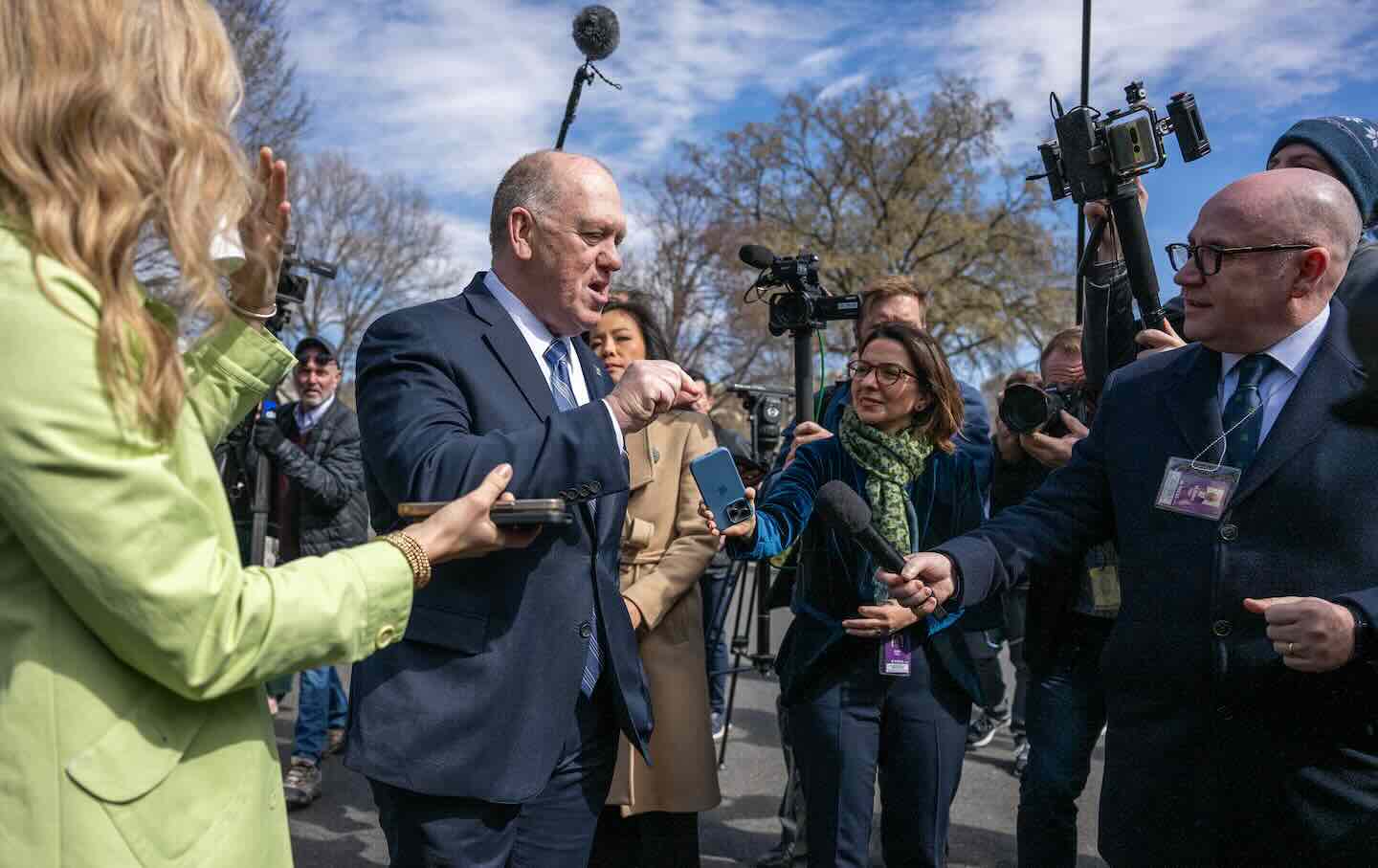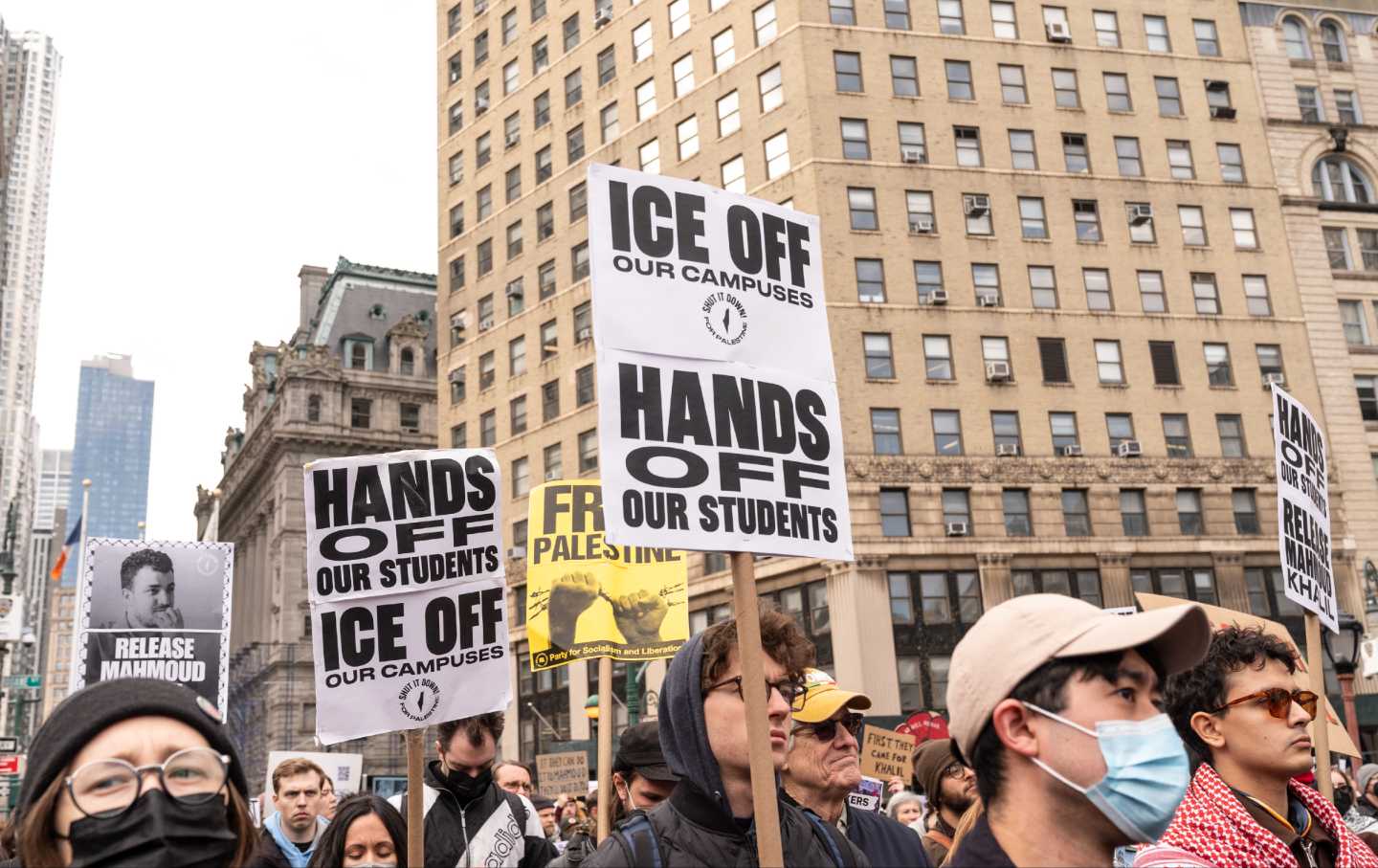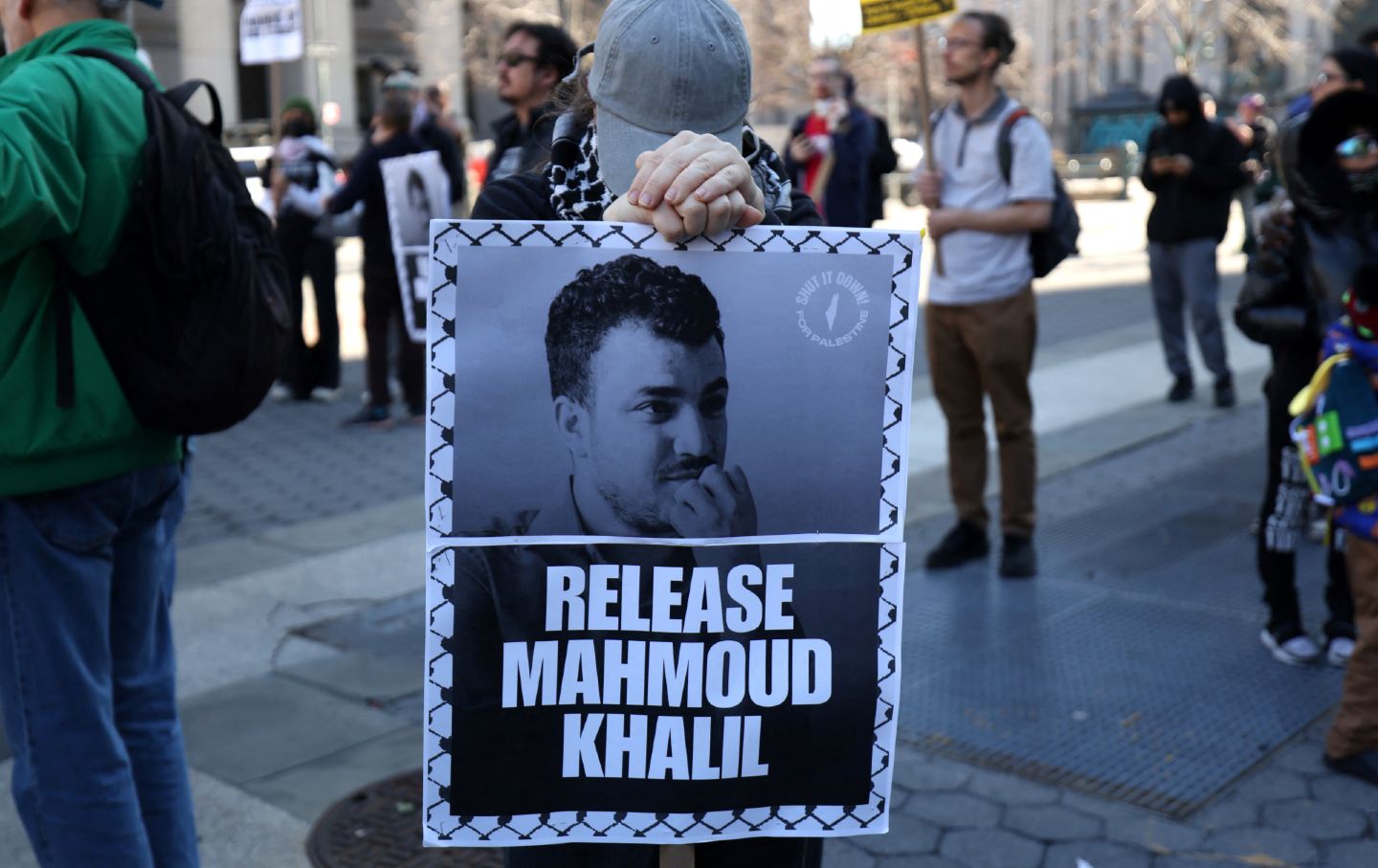The Powell Memo Helped Create Project 2025
A new investigative podcast shows the toxic legacy of the founding father of modern American plutocracy.

When Supreme Court Justice Lewis Powell died in 1998, The New York Times’ obituary hailed him as a judge “who brought a voice of moderation and civility to an increasingly polarized Court during his 15-year tenure.” The newspaper added, “He was the balancer and compromiser, a political moderate with an aversion to heated rhetoric and doctrinal rigidity.”
As so often, the Times was distilling the elite consensus, a view that had an element of truth only if one accepted a very narrow meaning of “moderation.” Powell’s reputation as an avatar of middle-of-the-road sanity rested largely on his social liberalism. Powell joined the Supreme Court in 1972 after a long career as one of the nation’s top corporate lawyers, known particularly for his long association with the tobacco company Philip Morris. Powell’s reputation for moderation rested largely on his personal style as an old-school Southern gentleman and his liberalism on social matters. He was part of the 7-2 majority that affirmed a constitutional right to abortion in Roe v. Wade and helped protect affirmative action in Regents of the University of California v. Bakke (1978). Both decisions have been overturned by subsequent right-wing courts.
Powell also benefited from the contrast between his social liberalism and the increasingly strident conservatism of more recent Republican appointees to the Supreme Court. When Powell resigned in 1987, Ronald Reagan tried to replace him with Robert Bork, a rebarbative reactionary who was seen as the antithesis of Powell. Bork’s nomination failed, but subsequent Supreme Court justices such as Clarence Thomas and Samuel Alito have made many centrist liberals nostalgic for the age of Lewis Powell.
Yet Powell’s moderation was highly selective, coming into play only on issues where the power of big business was not at stake. On economic matters—which make up the bulk of cases that come before the Supreme Court—Powell was no compromiser but an open partisan of unchecked corporate domination of society.
Part of the strength of the excellent new documentary podcast series Master Plan (created by the journalist David Sirota and his team at The Lever) is that it thoroughly debunks the bland image of Powell as a moderate and instead shows that he was one of the founding fathers of modern American plutocracy. Powell earns particular pride of place in the show because of his authorship of a notorious 1971 memo (prepared for the US Chamber of Commerce) that laid out a strategy for a corporate counterrevolution against the emerging social movements of the 1960s and early ’70s (notably the Black Power movement, environmentalism, and consumer protection). The memo was a call to arms for corporate America to use its economic power to push back against the left, with particular emphasis on the importance of gaining sway over the courts, the academy, and the media.
The Powell Memo was the Project 2025 of the Nixon era—a detailed program for establishing and entrenching right-wing power over the commanding heights of American government and society.
On the left, there’s been much dispute over the actual impact of the Powell Memo: Was it really the blueprint for the conservative counterrevolution against liberalism that has remade America—or just the little-read grousing of an angry corporate lawyer?
Writing in The American Prospect in 2005, policy analyst Mark Schmitt decried the “myth” that the memo was influential. Schmitt claimed: “The memo was circulated within Chamber of Commerce circles and became public after Powell’s confirmation to the court, when journalist Jack Anderson unearthed it to question Powell’s judicial temperament. After that, it seems to have been forgotten.”
To its credit, Master Plan forthrightly addresses Schmitt’s reasonable argument, and uses fresh investigative reporting to document that the Powell Memo, far from having been “forgotten” after Jack Anderson’s reporting, was in fact the seedbed for high-level right-wing organizing that undergirds the conservative counterrevolution.
To illuminate both the Powell Memo and its legacy, Master Plan highlights Powell’s formation during his career as a corporate lawyer. He was no mere legal-gun-for-hire for Philip Morris but a full-fledged wartime consigliere, deeply involved in strategizing the firm’s long campaign of disinformation to discredit the science proving that smoking causes cancer. This campaign included pioneering the creation of astroturf groups that both lied about the science and pretended to be independent grassroots voices—a technique later picked up by fossil fuel firms promoting climate change denial.
This opposition to mainstream medical science grew out of a belief that nothing should stand in the way of corporate profit, certainly not any concern for the health of individuals or collective concern for environmental costs. Part of the spark for the Powell Memo was Powell’s anger that consumer advocate Ralph Nader was becoming a popular hero, subject to glowing profiles even in pro-business journals such as Fortune.
This pro-capitalist attitude went hand-in-hand with rabid anti-communism and a willingness to attack any radical movement as subversive. During his years as a corporate lawyer, Powell was a close confidant of FBI director J. Edgar Hoover and an informant to the FBI. The Powell Memo compares the Black Panther Party and New Left groups to Nazis.
The Powell Memo was written at a time when corporate America felt under siege by the rising demands of new social movements. It helped galvanize the counterrevolutionary reaction to progressive politics that encompassed not just Midwestern manufacturers and petite bourgeoisie (who had long formed the backbone of the American right) but also new allies among country club Republicans and corporate America (in other words, the sort of people Powell worked with at Philip Morris). These groups had been at odds since the start of the Cold War—which divided the isolationists from the internationalists—but the Powell Memo figured out a way to unite them against a common enemy.
The Powell Memo offered the business world an approach to politics that Powell had already seen work in Philip Morris’s campaign against medical science: a flexing of lobbying power through astroturf groups and a two-fisted opposition to any attempt to limit corporate spending in politics.
Master Plan opens with a remarkable scene that took place after Powell was elevated to the Supreme Court. Philip Morris threw a lavish party, hiring none other than legendary CBS News anchor Walter Cronkite to emcee a show highlighting key moments in Powell’s life. Powell was also presented with a gift: a judicial gown with the Phillip Morris logo stitched on—as if he were a race car driver advertising his sponsor. There’s not much of a leap from that gown to the expensive gifts Clarence Thomas and Samuel Alito have accepted from their billionaire pals.
Far from being forgotten, the Powell Memo was an underground bestseller in business circles. The Chamber of Commerce made copies easily available in the many thousands. Readers of the memo include a veritable pantheon of right-wing donors: the Koch brothers, Richard Mellon Scaife, and Joe Coors.
In 1973, the Chamber of Commerce organized two Powell Memo Task Force meetings. One was held in Disney World and was attended by Republican House minority leader Gerald Ford (who would soon to ascend to the presidency). Other members of the task force, as David Sirota notes, “included CBS president Richard Jenks, ABC executive James Hagerty, Ad Council chairman Barton Cummings, Metromedia executive Mark Evans, Hill & Knowlton president James Cassidy, and newspaper magnate Edward Scripps II.”
Popular
“swipe left below to view more authors”Swipe →A concurrent Powell Memo Task Force met in Dallas and featured a speech by a young television producer, Roger Ailes—later the founder of Fox News. According to a report by attendee John Howard (president of Rockford College), Ailes “outlined the power which advertisers would be able to exert upon TV programming if they were moved to do so.” Ailes advised guests on “where and how they can apply leverage and be given the tools to exert the leverage.”
In 1974, CBS president Arthur Taylor in correspondence wrote about how the Powell Memo Task Force spurred him to push journalists at this network to be friendlier to big business. Taylor wrote, “I’ve been attempting as persuasively as possible for the last year to correct the situation at CBS News with some results, but I’m afraid it’s going to take a long time.”
Given the evidence presented in Master Plan, the Powell Memo had a very clear real-world impact. It wasn’t a distant shooting star. It was a massive asteroid that smashed the earth. It provided the theoretical program for right-wing think tanks in the coming decades of ideological war, and gave corporate donors a strategy for maximizing the impact of their spending in politics. More broadly, it can be fairly seen as the inspiration for such institutions as Fox News and the Federalist Society.
From the vantage point of the present, the Powell Memo was the precursor to Project 2025. The question that should haunt us is: If the Powell Memo achieved so much, how much more might Project 2025 accomplish?
Support independent journalism that exposes oligarchs and profiteers
Donald Trump’s cruel and chaotic second term is just getting started. In his first month back in office, Trump and his lackey Elon Musk (or is it the other way around?) have proven that nothing is safe from sacrifice at the altar of unchecked power and riches.
Only robust independent journalism can cut through the noise and offer clear-eyed reporting and analysis based on principle and conscience. That’s what The Nation has done for 160 years and that’s what we’re doing now.
Our independent journalism doesn’t allow injustice to go unnoticed or unchallenged—nor will we abandon hope for a better world. Our writers, editors, and fact-checkers are working relentlessly to keep you informed and empowered when so much of the media fails to do so out of credulity, fear, or fealty.
The Nation has seen unprecedented times before. We draw strength and guidance from our history of principled progressive journalism in times of crisis, and we are committed to continuing this legacy today.
We’re aiming to raise $25,000 during our Spring Fundraising Campaign to ensure that we have the resources to expose the oligarchs and profiteers attempting to loot our republic. Stand for bold independent journalism and donate to support The Nation today.
Onward,
Katrina vanden Heuvel
Editorial Director and Publisher, The Nation
More from The Nation

Hey Irish Catholic Trump Supporters: Your People Were the Original Alien Enemies Hey Irish Catholic Trump Supporters: Your People Were the Original Alien Enemies
Irish Catholics who back Trump would do well to remember the origins of the Alien Enemies Act.

“Essentially Cages”: ICE Is Using Courthouse Cells for Lengthy Detentions “Essentially Cages”: ICE Is Using Courthouse Cells for Lengthy Detentions
Detainees report not having access to private toilets, showers, hygiene products, and lifesaving HIV and diabetes medication.

“I’m Terrified”: Trans-Feminine Athletes in Their Own Words “I’m Terrified”: Trans-Feminine Athletes in Their Own Words
In part two of a series, trans women athletes describe what it’s like to compete in the Trump era.

Columbia Is Betraying Its Students. We Must Change Course. Columbia Is Betraying Its Students. We Must Change Course.
The administration is choosing complicity over courage in the case of Mahmoud Khalil. It’s time for the faculty to demand a new path.

The Trans Cult Who Believes AI Will Either Save Us—or Kill Us All The Trans Cult Who Believes AI Will Either Save Us—or Kill Us All
What the Zizians, a trans vegan cult allegedly behind multiple murders, can teach us about radicalization and our tech-addled politics.

We Are Asking the Wrong Questions About Mahmoud Khalil’s Arrest We Are Asking the Wrong Questions About Mahmoud Khalil’s Arrest
The only relevant question is not “How can the government do this?” It is “How can we who oppose this fascist regime stop it?”


